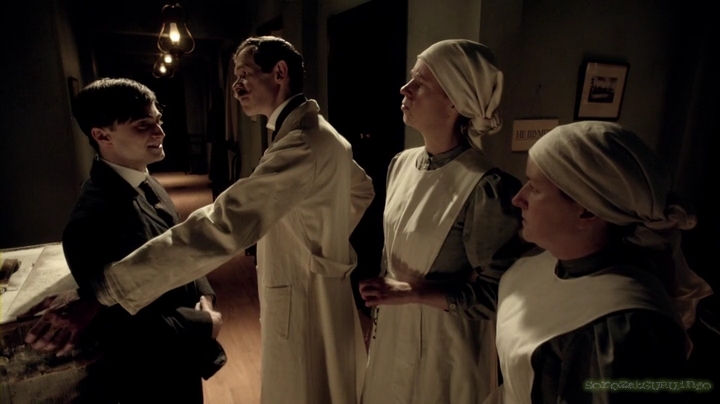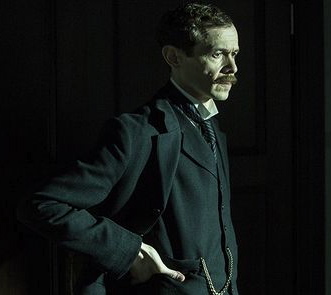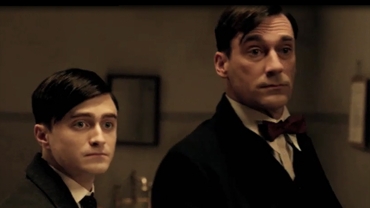A ‘Playhouse Presents’ Production, ‘A Young Doctor’s Notebook,’ Based on Mikhail Bulgakov’s ‘Notes from a Country Doctor’
I was not sure what to expect from a British TV production of a series based on the semi-autobiographical sketches of Mikhail Bulgakov, written in the mid-1920’s in Russia (see earlier post—‘Harry Potter and Don Draper do Bulgakov’). This four-part Playhouse Presents production, ‘A Young Doctor’s Notebook’, was initially aired at the end of 2012 on Britain’s Sky Arts network. On viewing the first episode, I was not surprised to find it to be very British in many ways, but with an impressive stock of allusions to Russian literature and culture. A great deal of effort seems to have been spent to get a lot into the seemingly simple story of the arrival at an isolated, seriously understaffed rural hospital, of a newly graduated medical student from Moscow.

‘A Young Doctor’s Notebook’ combines hints of Gogol and Chekhov with a little Cold War drama, while the direction and acting clearly show influences of silent-film era physical comedy, together with sight-gags, and a good pinch of Monty Python. The essence of Bulgakov’s style, though, is nicely portrayed, casting some really dark and disturbing themes in a comic context, and juxtaposing the very real and immediate with the patently absurd. This would seem to be the intention, given the appraisal of Bulgakov’s book by Daniel Radcliffe as “funny, grotesque and heartfelt in equal measure.” Radcliffe plays the “Younger Doctor” and is a self-confessed “obsessive Bulgakov reader.”
The most striking element of this first episode is the interplay between the older doctor and his younger self. The younger is obviously aware of his future incarnation following him around, and often engages him in conversation, but there is never any discussion of this oddity. Both treat the situation as, in fact, perfectly normal. Their relationship is most like that of brothers, or of annoying yet indispensable college roommates.
Another interesting aspect of this presentation is the characters’ names, or lack thereof. Only the women are referred to by given names. We almost never hear those of the male characters; we only get descriptions of what they are–the “Doctor”, or “The Feldsher” (a Russian word meaning “doctor’s assistant”, or “nurse”)—and John Hamm’s character, given in the credits as the “Older Doctor,” is never referred to by anyone. This use of names is in marked contrast to the style of Bulgakov’s later works of fiction in which characters’ names are weighted with meaning, or are quite often borrowed from famous composers of music (see previous post-‘The Nature in Bulgakov’s Names’).

The exception to the lack of given names for male characters is a man who is, at the same time, ever-present at this hospital in remotest Russia, and quite dead: Leopold Leopoldovich! The two nurse-midwives, Pelageya and Anna, invoke his name continuously, and always in hushed, reverent and adoring tones. As the only man whose name spoken, and always in full, with the name and patronymic—Leopold Leopoldovich!—it sounds like an incantation. Mostly the nurses utter it to provide critical comparison of the newly arrived bumbling young doctor, with this former doctor, whose imposing self-portraits seem to dominate every room (“Leopold Leopoldovich was a prolific artist!”). These comparisons run the gamut from advice as to how Leopold Leopoldovich would have proceeded with a particularly troublesome childbirth, to constant reminders that Leopold Leopoldovich was “a lot taller,” older, and wore a beard.
The plot moves from an opening scene, titled as “Moscow, 1934,” in which the Older Doctor sits at a desk as two uniformed officers move around him as they search his papers. These are most likely agents of the NKVD, a forerunner of the KGB. Picking up a notebook they have dug out of somewhere and flung on his desk, the doctor sees it is his journal from 1917, and muses to himself, “I was happy in 1917.” As 1917 was one of the most chaotic and tumultuous years in the history of modern Russia, this is an intriguing comment. The notebook inspires his reminiscences of that year, when he was sent, immediately after graduating medical school, to serve in a rural hospital in the remote town of Muryovo.
A number of classic Russian themes are highlighted in this encounter of the bright but inexperienced young Muscovite with the reality of medical practice, and life in general, in the Russian countryside. The vast cultural gap between urban, educated Russia and rural Russia, which in 1917 was where the majority of the population lived, is put on display. The young doctor behaves, and is treated, like a foreigner, or even from another world. The encounters between himself and the Feldsher point this out in ways that are both poignant and very funny.

The Feldsher is one of my favorite characters n ‘A Young Doctor’s Notebook’, and perhaps the most Russian. He evokes figures often found in Chekhov: nobles who dream of Moscow as if it were paradise on earth or who hold pretensions to great intelligence and “modern” education, or the ubiquitous old serf who gives unwitting commentary on the true state of things through seemingly inane outbursts.
The episode culminates in the tooth-extraction scene, notable for its honesty, brutality, slap-stick and absurdity. Not wanting to give too much away, I will just mention that I was reminded here of the scene in Monty Python and the Holy Grail where King Arthur meets the Black Knight.
In the end we are taken back (or forward in time) to the older doctor’s office, still being searched, but still with no explanation of what is going on here. It is my guess that the doctor has been, for whatever reason, targeted as an “enemy of the revolution,” possibly for some criticism of the Stalin regime, and so subject to persecution at the hands of the state. The important development in this final scene, however, is how the notebook itself becomes a character in the story. Curiosity about its fate is the hook that makes me really want to catch the next episode of ‘A Young Doctor’s Notebook’.
note: I watched this full episode on YouTube, and just last night caught episode 2 there. But as of today (Wed. 4/17/2012) these episodes have been pulled. A search on YouTube brings up the error message- “This video is no longer available due to a copyright claim by British Sky Broadcasting, Ltd..”
© 2013, John Dougherty. All rights reserved

